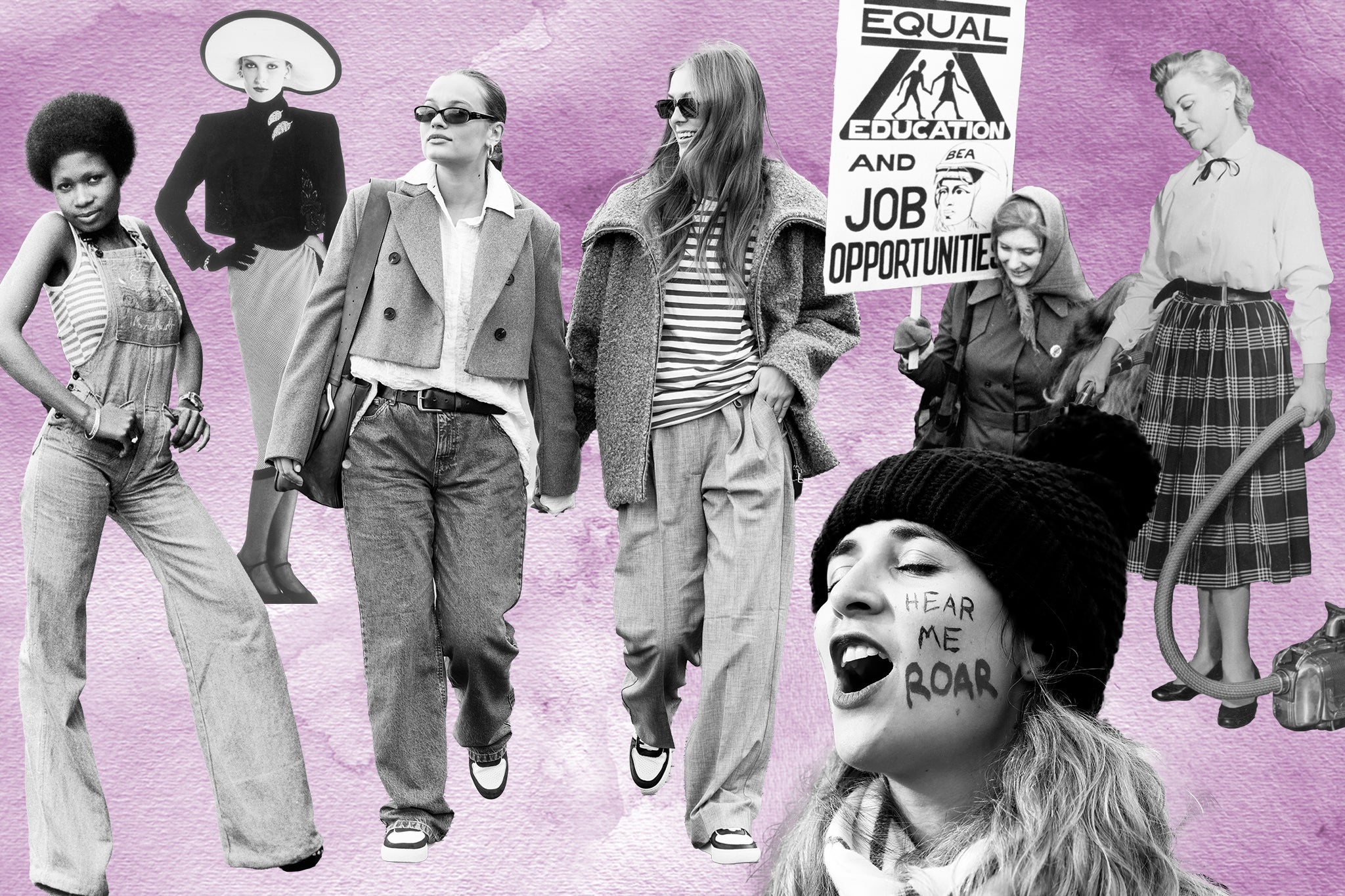So, when was the best time to be a British woman?
Surely it’s now? We live longer, do better in education and make men feel like we’ve never had it so good – so why doesn’t it seem that way, asks Sophie Walker, who unpacks the facts from the fiction for International Women’s Day

British women outlive British men. Girls outperform boys in GCSEs, and are more likely to go to university than men. The last general election saw the highest proportion of female MPs elected yet. Now, 30 per cent of young men think it will be harder to be a man than a woman in the next 20 years.
International Women’s Day offers an assessment of whether it’s a good time to be a woman. And it might seem reasonable to suggest that in 2024, 100 years after women were allowed to vote, get divorced and inherit property, it’s even the best time to be a woman.

But is this really accurate? The interaction between society, business and politics is complex and shifting. Fixing the inequalities in women’s lives can feel like trying to change the tyres on a moving car. Feminism’s efforts have contributed to legislative progress, from the Sex Discrimination Act of 1975 to the Equality Act of 2010.
But the 54,000 pregnant women being pushed out of work daily in the UK know the limits of laws. And the Equality Act didn’t prevent the Conservatives from pushing through austerity policies that hurt women to such an extent that The Women’s Budget Group called them “gender-based violence”.
Worse, two polls this year suggest we’re going backwards. A recent Ipsos poll found that 60 per cent of Gen Z men across 31 countries believed that women’s equality discriminated against men, while a survey by the Crown Prosecution Service showed less than half of all 18- to 24-year-olds understood you can be raped without force or if you are in a relationship.
“What I notice over years of campaigning is men’s refusal to listen to the learnings of feminism and look at root causes – sex inequality, the sexual objectification of women, male entitlement – because then they’d have to make systemic change,” says Karen Ingala-Smith, an expert in male violence against women.
In 2012 she counted eight women killed by men in the first three days of the year. She kept counting and in 2015 founded The Femicide Census with Clarissa O’Callaghan. Its data shows “things haven’t changed much in the last 15 years. On average, a woman has been killed by a man in the UK every 2.5 days and 60 per cent of them are killed by a partner or former partner.”
The scale of violence against women, including domestic abuse and rape at a rate experienced by one in four, might seem a priority for the UK police and justice system, not least given growing protests. (Activism among young people extends to 70 per cent of Gen-Zers involved in a social or political cause.)

But this year, the Femicide Census read in parliament on the same day the Angiolini Inquiry found police systems so poor there is nothing to stop another Wayne Couzens – reported to police eight times before he killed Sarah Everard – from “operating in plain sight”.
“Unfortunately, you can be living in the ‘best time’ for a woman to be speaking out about gender inequality and also the worst time to expect anything to be done about it,” says Laura Bates, founder of the Everyday Sexism Project, nodding towards data showing reported rape cases are at an all-time high while a pitiful 1.3 per cent result in a charge. “This is perhaps the worst period in history for the exposure of institutional misogyny, racism and sexual violence.”
Pushback against women’s rights is fierce – see the enormous fan base for self-proclaimed misogynist Andrew Tate, facilitated by social media platforms that Bates points out are boosting the backlash via an algorithmically facilitated radicalisation of young men and boys.
“The severity of this problem and the risks it poses are massively under-acknowledged, and the toll on women and girls of living amid an onslaught of digital harassment and crimes – revenge pornography, online abuse and coercion – is largely invisible because nobody takes any of these harms seriously.”
Mental health stats show girls buckling in a way that they haven’t reported before: nearly a quarter of 16-year-old girls in England were in contact with public mental health services last year, more than twice the proportion accessing this care four years previously.
I don’t think there has ever been a good time to be a woman in Britain. I am a Black British woman – and those three words are very loaded
It’s a vicious circle: Young Women’s Trust has found that 32 per cent of young women with a long-term mental health condition would not feel comfortable reporting instances of discrimination in the workplace. Furthermore, discrimination at work appears to be becoming the norm for young women – half of whom say they have faced it – and it’s on the rise.
Women might have been allowed to open their own bank accounts since 1975, and access a minimum wage from 1999, but discrimination finds plenty of ways to limit women’s financial independence.
Young Women’s Trust notes that 23 per cent of young women have been paid less than the minimum wage and the same amount paid less than young men for the same work. There are still nearly as many men called Simon as female chief executives of FTSE 100 boards. Meanwhile, Fawcett’s most recent pay gap report found that, at the current rate of change, things won’t close until 2051 – meaning women born before 1983 can celebrate by drawing their pensions.
Racially minoritised young women are more likely to worry about salaries and job security. Fawcett found that 50 per cent of women of Pakistani or Bangladeshi heritage and 48 per cent of women of Black African heritage were criticised for behaviours other colleagues get away with at work.
The EHRC also found just under half of disabled women are neither employed nor actively seeking work, while those who do have a job face a disability pay gap of 18.9 per cent.

Tinuke Awe, businesswoman and activist, is blunt: “I don’t think there has ever been a good time to be a woman in Britain. I am a Black British woman – and those three words are very loaded.”
Awe co-founded and runs Five X More, which campaigns for better maternal health and outcomes for Black women in Britain who are, as their name infers, five times more likely to die in pregnancy and childbirth. She is also mother to an autistic child and knows that despite being more often identified as having special educational needs and disabilities, Black children are less likely to get the support they need.
On top of that, she’s a self-employed entrepreneur up against the astonishingly dismal fact that in the last 10 years, Black female founders received 0.02 per cent of the venture capital funding while a separate report found that despite there being more female-founded firms than ever before, in 2022 all-female-led businesses received only 6 per cent of venture funding.
Having more women in government could make a difference. In her testimony to the Covid inquiry, former deputy cabinet secretary Helen MacNamara explained how a “toxic” macho environment affected decision-making during the crisis.
Now in the cost of living crisis, male-dominated Cabinet rooms and policy offices still fail to recognise that women’s lower incomes and caring responsibilities make them more reliant upon – and vulnerable to – the loss of social security and public services. As a result, more women than men now live in poverty in the UK.

Women’s political representation is still stuck at a third at both national and local levels. Meanwhile, 93 per cent of female politicians say that online abuse and harassment has a negative impact on how they feel about being an MP.
Hannah Stevens, director of ElectHer, is working to support and fund women political candidates who are often left feeling unsafe in an atmosphere of relentless misogynistic abuse where female politicians are often on the receiving end of threats to rape and kill them.
Still, Stevens is seeing the dial shift and the result that is having. “We are seeing an impact in spaces like the Scottish parliament which has 45 per cent women members. The period poverty bill also indicates progress made when more women are at the table.”
Could national conversations sparked by women be a sign that women’s healthcare is improving? Not necessarily, the maternal mortality rate is at its highest in 20 years and still less than 2.5 per cent of publicly funded research is dedicated to reproductive health and childbirth.
Meanwhile, much medical research is still based on the male body and male experiences which has led to a “gender data gap” – sometimes with deadly effects for women.
Maternal rights are still woeful and in the last 10 years, Joeli Brearley and her charity Pregnant Then Screwed is still having to support women being pushed out of the workplace. The government’s pandemic plans overlooked childcare needs and there is still a problem with unaffordable, inaccessible childcare in the UK – even with the government’s promised £4bn boost to free childcare coming into effect next month.
So, when will we know that it is a good time to be a British woman? Brearly puts it succinctly: “When women’s roles in conceiving and raising the next generation don’t render them liabilities in a system designed by and for men.”
Sophie Walker was the founder and leader of the Women’s Equality Party from 2015-2019
Join our commenting forum
Join thought-provoking conversations, follow other Independent readers and see their replies
Comments


Bookmark popover
Removed from bookmarks